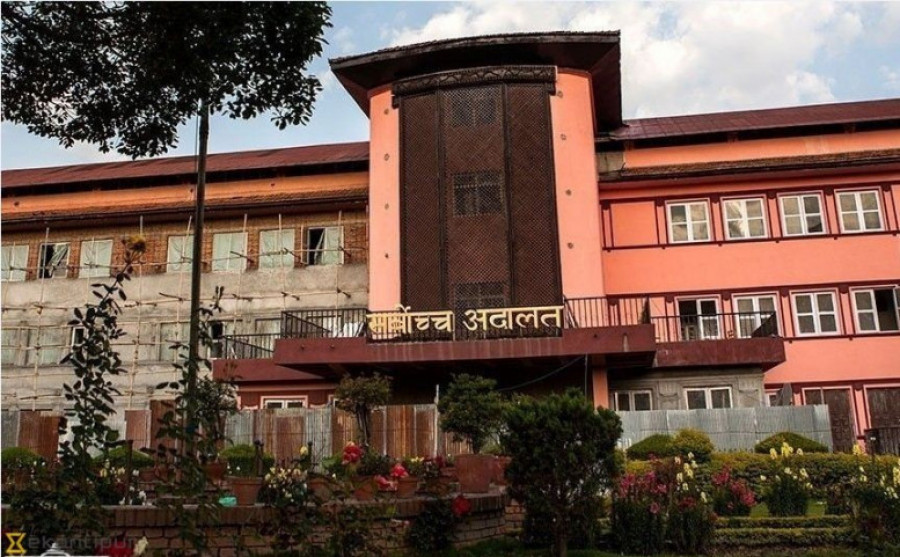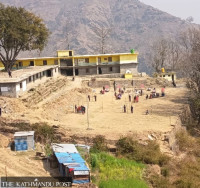National
Constitutional Bench to continue hearing petitions against House dissolution
The five-member bench led by chief justice rejects calls for sending the writ petitions to an extended full bench, saying the issue warrants serious constitutional interpretation.
Binod Ghimire
The Constitutional Bench on Friday decided to continue hearing the writ petitions against Prime Minister KP Sharma Oli’s move of dissolving the House of Representatives itself, turning down lawyers’ demands that they be sent to an extended full bench.
The five-member bench, led by Chief Justice Cholendra Shumsher Rana, said that since the issue needs “serious constitutional interpretation”, the petitions don’t need to be sent to an extended full bench.
“The bench said there is no need to send the writs to the extended full bench,” Bhadra Kali Pokharel, spokesperson for the Supreme Court, told the Post. “The Constitutional Bench will conduct the regular hearing on the writs against the House dissolution.”
Though the bench generally sits twice a week—on Wednesday and Friday—continuous hearing will be conducted starting Sunday, given the gravity of the issue, according to Pokharel.
Oli had recommended that the President dissolve the lower house on December 20. The recommendation was approved by the President the same day.
Lawyers arguing on behalf of 12 petitions challenging the House dissolution had demanded that the writ petitions be heard by an extended full bench. But those arguing on behalf of the defendants—the Office of the Prime Minister and Council of Ministers and the Office of the President—said that since the issue demands constitutional explanation, the writs must be heard by the Constitutional Bench.
The lawyers arguing on behalf of the defendants said that the very demand for an extended full bench is against the spirit of the constitution, which allows the Constitutional Bench to take decisions on issues related to the interpretation of the constitution.
Senior advocate Bishnu Bhattarai said extended full benches heard the writs of the House dissolution in the past because there was no provision for the Constitutional Bench then.
In 1994 and 2002, the Supreme Court had approved the moves of then prime ministers Girija Prasad Koirala and Sher Bahadur Deuba of dissolving the House of Representatives, while it had rejected Manmohan Adhikari and Surya Bahadur Thapa governments’ similar moves in 1995 and 1998, respectively. All the decisions were taken by an extended full bench comprising 11 Supreme Court justices.
“If an extended full bench is formed, then that will mean the chief justice’s decision to send the writs to the Constitutional Bench was wrong,” said Bhattarai.
After a preliminary hearing on December 23, a single bench of Rana had decided to send the 12 petitions against the House dissolution to the Constitutional Bench. One writ against the House dissolution was directly registered with the bench.
As per the decision of Rana’s bench, a Constitutional Bench led by Rana himself was formed on December 25, which directed the Office of the President and Prime Minister’s Office to submit justifications in writing why the House was dissolved and demanded original copies of their decisions.
Lawyers arguing on behalf of the petitioners on January 6 had said that Justice Hari Krishna Karki’s inclusion in the bench led to a conflict of interest and that the writs should be sent to an extended full bench.
Karki, who had served as the attorney general during Oli’s first stint as prime minister in 2015, recused himself from the bench. The hearing was adjourned till Wednesday. Chief Justice Rana replaced Karki with Justice Sapana Pradhan Malla when the bench was constituted on Wednesday.
On Friday, the amicus curiae too put forth its advice.
Senior advocate Badri Bahadur Karki, an amicus, suggested continuing the hearing by the Constitutional Bench by increasing the number of justices. He argued that increasing the number of justice will not be considered a breach of the constitution. Chief Justice Rana, however, said it directly contradicts Article 137 (1) of the constitution.
The Article says, “The bench [Constitutional Bench] shall comprise the chief justice and other four justices designated by the chief justice on the recommendation of the Judicial Council.”




 27.41°C Kathmandu
27.41°C Kathmandu














